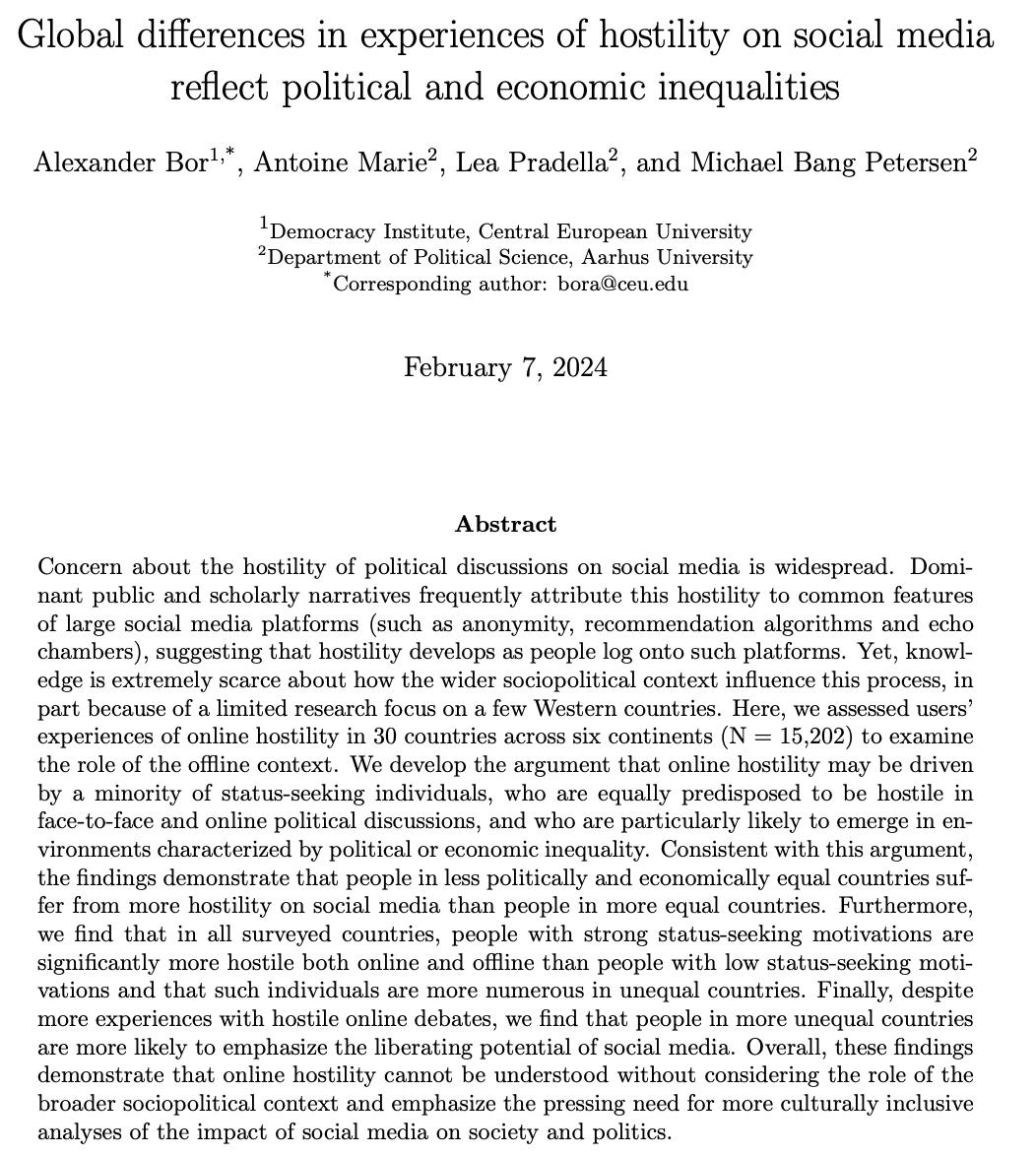Today, I stood before the Danish parliament on a public hearing on social media & democracy
As a researcher of online hate, I could have spent hours. But I had 10 minutes, so I had to be focused
The title was "The Myths About Social Media"
Here is what I said👇
🧵(1/12)
As a researcher of online hate, I could have spent hours. But I had 10 minutes, so I had to be focused
The title was "The Myths About Social Media"
Here is what I said👇
🧵(1/12)
The data is clear: We have a problem.
Citizens find online debates more hateful; the non-haters withdraw from the discussions; and politicians & public figures are harassed online.
But: There are myths about the causes. Solutions require correct problem-identification. (2/12)
Citizens find online debates more hateful; the non-haters withdraw from the discussions; and politicians & public figures are harassed online.
But: There are myths about the causes. Solutions require correct problem-identification. (2/12)
Myth 1: A lot of misinfo on social media
No, research suggests there is little, shared by few & having small effects.
Those sharing misinfo are not dumb. But they have intense political animus, which motivates to share what fits their worldview, true or false.
(3/12)
No, research suggests there is little, shared by few & having small effects.
Those sharing misinfo are not dumb. But they have intense political animus, which motivates to share what fits their worldview, true or false.
(3/12)
This opens for new challenges:
1) The real problem is biased sharing. Even if everything is true, selective sharing will create a biased picture.
2) People can learn to spot fake news. The real problem is intellectual humility: getting them to trust & share real news. (4/12)
1) The real problem is biased sharing. Even if everything is true, selective sharing will create a biased picture.
2) People can learn to spot fake news. The real problem is intellectual humility: getting them to trust & share real news. (4/12)
Myth 2: Social media makes people hateful.
No, research suggests that online hate reflects offline frustrations that make them hateful both online & offline.
The hateful are few in numbers but they are attracted to politics and, hence, are much more visible.
(5/12)
No, research suggests that online hate reflects offline frustrations that make them hateful both online & offline.
The hateful are few in numbers but they are attracted to politics and, hence, are much more visible.
(5/12)
This opens for new challenges:
1) Long-terms solutions to online hate requires solving the causes of offline frustrations. No quick fixes exist.
2) As the hateful are attracted to politics, it takes effort to keep debates non-hostile. It requires clear & enforced rules.
(6/12)
1) Long-terms solutions to online hate requires solving the causes of offline frustrations. No quick fixes exist.
2) As the hateful are attracted to politics, it takes effort to keep debates non-hostile. It requires clear & enforced rules.
(6/12)
Myth 3: Social media are echo chambers.
No, research shows that, for most, social media breaks the bubble. We are more connected to "the others" on social media than in our offline lives. That is why it feels unpleasant - because it is the most hateful "others" we meet.
(7/12)
No, research shows that, for most, social media breaks the bubble. We are more connected to "the others" on social media than in our offline lives. That is why it feels unpleasant - because it is the most hateful "others" we meet.
(7/12)
This opens for new challenges:
1) Exposure to hate can help legitimize hate, in part because our views of the other political groups becomes biased.
1) If connectivity is the problem, short-term solutions involve focus on shielding against hate, not changing the haters. (8/12)
1) Exposure to hate can help legitimize hate, in part because our views of the other political groups becomes biased.
1) If connectivity is the problem, short-term solutions involve focus on shielding against hate, not changing the haters. (8/12)
All in all, social media are not that mysterious.
For decision-makers, social media is a window into the most frustrated.
For activists, social media is simply a tool to effectively accomplish their political goals. People are pretty much the same, online and offline.
(9/12)
For decision-makers, social media is a window into the most frustrated.
For activists, social media is simply a tool to effectively accomplish their political goals. People are pretty much the same, online and offline.
(9/12)
On this basis, I asked parliament to work on 4 solutions:
1) As the myths show, we need insight. Insist on openness & external oversight regarding data and algorithms from tech platforms.
1) As the myths show, we need insight. Insist on openness & external oversight regarding data and algorithms from tech platforms.
2) Prioritize tools that can enable people to shield themselves from exposure to hateful content. (10/12)
3) Focus on democratic--not just digital--education. The problem is not that people are not tech savvy. The problem is lack of rationalism.
4) Invest in remedying the offline frustrations that drives online hate. Ending hate requires real change in the offline world. (11/12)
4) Invest in remedying the offline frustrations that drives online hate. Ending hate requires real change in the offline world. (11/12)
Those were my input!
The hearing launches the parliament's effort to improve democratic debate in the age of social media. Find more info on this important effort here: ft.dk/da/aktuelt/tem…
You can find my slides (incl references) here: dropbox.com/s/6q94dkimrk75…
(12/12)
The hearing launches the parliament's effort to improve democratic debate in the age of social media. Find more info on this important effort here: ft.dk/da/aktuelt/tem…
You can find my slides (incl references) here: dropbox.com/s/6q94dkimrk75…
(12/12)
• • •
Missing some Tweet in this thread? You can try to
force a refresh













